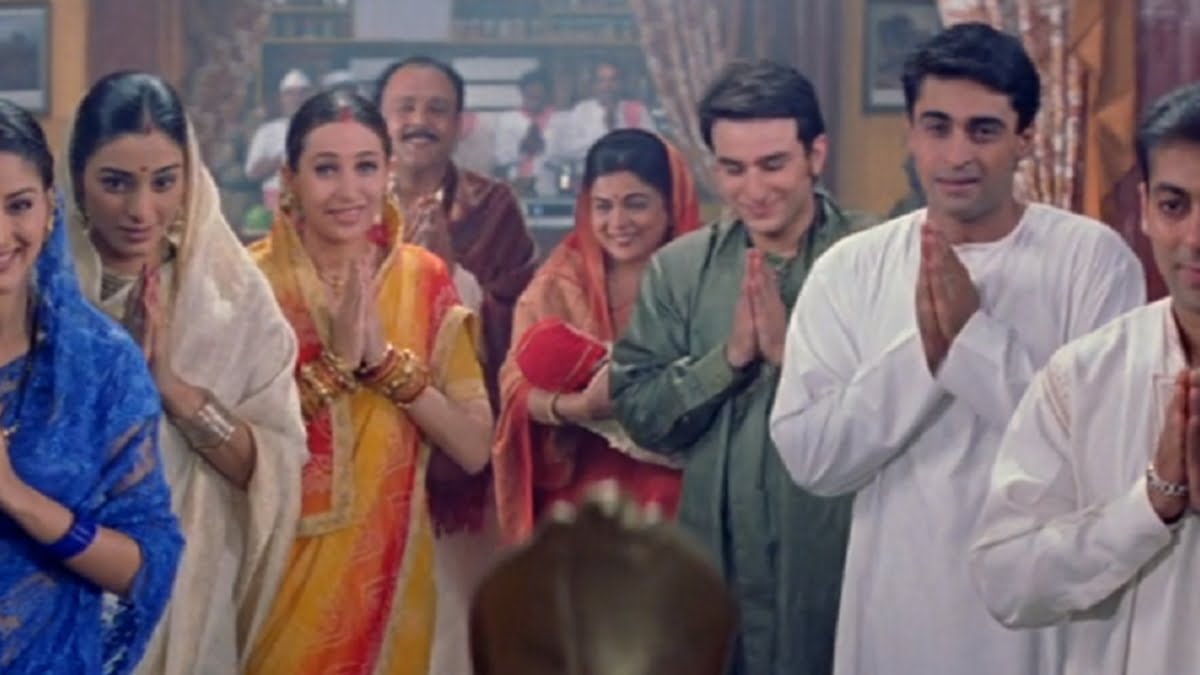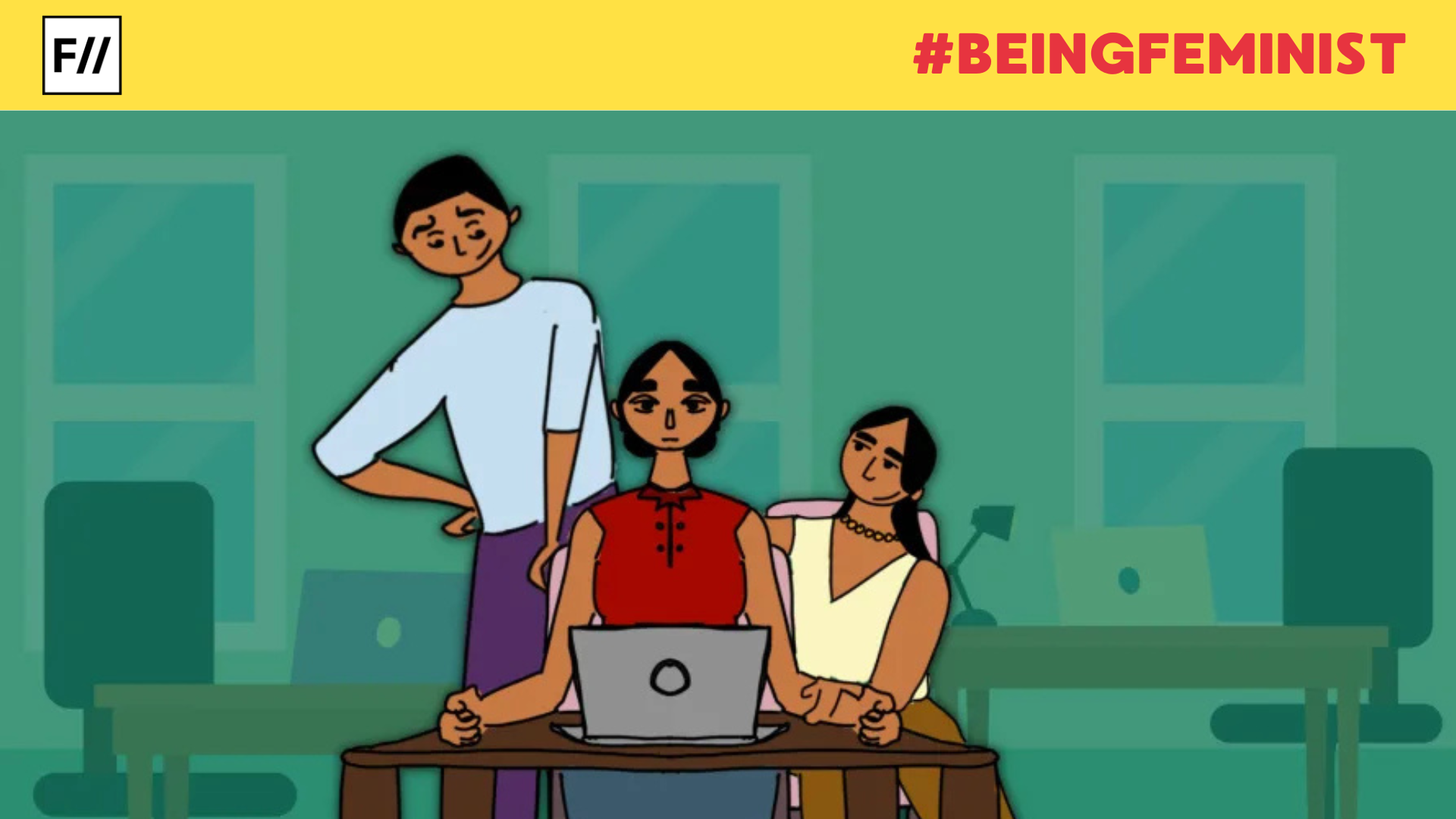Sooraj Barjatya has been peddling the narrative of sanskari Indian families through his movies since 1989 when he made his directorial debut with Maine Pyar Kiya. However, in this article, I show the covert misogyny that Sooraj Barjatya has been feeding his audience for the last 30 years.
Seema in Maine Pyar Kiya
Seema (Pervin Dastur), the daughter of Kishan’s (Rajeev Verma) business partner Ranjeet (Ajit Vachani) is a modern Indian woman who has a crush on Kishan’s son Prem (Salman Khan). In the movie, Seema’s character is pitted against that of Suman’s (Bhagyashree), who is a sanskari Indian girl from a humble background. As expected, Prem chooses Suman over Seema, and the movie almost demonises Seema for her choices because how can a woman be confident and comfortable with her sexuality?
Bhagwanti and Rita in Hum Aapke Hain Koun..!
Sooraj Barjatya demonises Bhagwanti (Bindu) and portrays her as a woman who is selfish, greedy and haughty, and has total disregard for other’s feelings. Bhagwanti insults the loyal house servant Lallu (Laxmikant Berde) and also insults Pooja (Renuka Sahane) and her family for not giving dowry to Pooja’s in-laws. Bhagwanti is pitted against Pooja, who is kind and caring towards Lallu, unlike Bhagwanti. Another female character Rita (Sahila Chadha), who is secretly in love with Prem (Salman Khan), is also portrayed in such an exaggerated comical way, that she comes across as a caricature. In one particular scene, when Rita is trying to cook a dish for Prem to impress him, she ends up messing the dish, and everyone makes fun of her. In this scene, Sooraj Barjatya suggests that women must cook and look after the family, and since Rita could not pass the test, she is not an ‘adarsh sanskari ladki,’ unlike Nisha (Madhuri Dixit) and her elder sister Pooja. Here again, Sooraj Barjatya pits women against each other, and the movie asserts how Nisha is a better match for Prem.
In a scene in Hum Aapke Hain Koun..!, Sooraj Barjatya suggests that women must cook and look after the family, and since Rita could not pass the test, she is not an ‘adarsh sanskari ladki,’ unlike Nisha (Madhuri Dixit) and her elder sister Pooja. Here again, Sooraj Barjatya pits women against each other, and the movie asserts how Nisha is a better match for Prem.
Also read: Bollywood’s Obsession With Disposable Female Characters
Mamta’s friends in Hum Saath-Saath Hain
Sooraj Barjatya’s depiction of misogyny is not even subtle here. In this movie, Mamta’s (Reema Lagoo) friends—Shanti (Kunika), Krishna (Jayshree T), and Armani (Kalpana Iyer) poison Mamta’s mind, after which Mamta asks her eldest adopted son Vivek (Mohnish Behl) and his wife Sadhna (Tabu) to leave the house. What is more, when Mamta realises her mistake, she bans her friends from her house. Sooraj Barjatya uses the clichéd and problematic trope, that is, women as home-breakers and this is, undoubtedly an unacceptable misogynist portrayal.
Suseelah and Roopa in Main Prem Ki Diwani Hoon
Suseelah (Himani Shivpuri) and Roopa (Tanaaz Irani)—the mother and elder sister of Sanjana (Kareena Kapoor) respectively in this movie, are presented in such a way that they come across as the adversaries of Sanjana. Right from the beginning, Suseelah is critical of Sanjana’s behaviour, her clothes—basically everything about her, and she gives a makeover to Sanjana so that Sanjana can impress Prem Kishan (Hrithik Roshan), who Suseelah thinks is a big businessman. However, when Suseelah realizes that it is Prem Kumar (Abhishek Bachchan), who is rich, she quickly changes her tactics to impress Prem Kumar instead, and appears extremely disrespectful towards Prem Kishan. Suseelah also regularly insults and scolds her loyal house servant Shambhu (Raju Shrivastava), but on the other hand, Suseelah’s husband Satyaprakash (Pankaj Kapur) is an extremely well-behaved man with a calm demeanour, who understands his daughter Sanjana. This contrasting portrayal of Suseelah and Satyaprakash is reflective of the inherent sexism in a lot of Sooraj Barjatya’s films.
Moreover, right up until the end, Suseelah and Roopa are hell-bent on getting Sanjana married to Prem Kumar even when they know that Sanjana loves Prem Kishan, and they change their minds only when Prem Kumar tries to explain to them how love is more important than money or power. This is extremely problematic because this again strengthens the flawed and overused argument that ‘aurat hi aurat ki dushman hoti hai,’. In reality, all women are the victims of patriarchy, and they have been conditioned to uphold the patriarchal beliefs which have been passed down to them through the generations. This also reveals how Sooraj Barjatya has portrayed Suseelah and Roopa as gold-diggers — another oft-used narrative employed to demonise women.
Rama in Vivah
In Vivah, Rama (Seema Biswas) is jealous of Poonam (Amrita Rao), and Rama hates Poonam with all her heart because Poonam is ‘fair’ unlike Rama’s daughter Rajni (Amrita Prakash). After the death of her parents, Poonam has been living with her uncle—Krishnakant’s (Alok Nath) family, and unlike Rama—who behaves rudely, Krishnakant is extremely loving and caring towards Poonam. Again, Sooraj Barjatya has made contrasting portrayals of Rama and Krishnakant — the man as calm, rational and composed, and the woman as conniving and high on her emotions, reveal the inherent sexism of Sooraj Barjatya. Moreover, it is only after Poonam’s out of the way sacrifice for Rajni, does Rama undergo a change of heart—who up until now, has been demonised throughout the movie.
In Vivah, Sooraj Barjatya has made contrasting portrayals of Rama and Krishnakant — the man as a calm, rational and composed, and the woman as conniving and high on her emotions, reveal the inherent sexism of Sooraj Barjatya.
Natasha in Ek Vivaah… Aisa Bhi
Here, Natasha (Chhavi Mittal), who is an independent and successful woman, marries Anuj (Vishal Malhotra) and joins the humble middle-class abode of the Shrivastavas. Slowly, however, Natasha finds it difficult to adjust to the sanskari household of the Shrivastavas, where there are regular family functions and the feet-touching ritual is a must in these events. To top it off, Natasha is asked to wear heavy costumes and jewellery in these events and it slowly irks Natasha, but when Natasha voices her discomfort, she is immediately demonised as an ‘unsanskari bahu.’ Sooraj Barjatya shows this in contrast to Chandni (Isha Koppikar), the elder sister of Anuj, who sacrificed everything to look after her younger siblings after her father’s death. The movie takes its misogyny one step further when Natasha asks Anuj to shift with her into the flat that has been offered to her by her employer. Again, the problematic trope of women as ‘house-breakers’ has been used in this movie and Natasha is demonised for being independent and ambitious. A pattern that is repeated over and over in Sooraj Barjatya’s films is how there is a heavy comparison between two female characters to drive home the point ‘sanskari bahu = best bahu’.
A pattern that is repeated over and over in Sooraj Barjatya’s films is how there is a heavy comparison between two female characters to drive home the point ‘sanskari bahu = best bahu’.
Also read: Pati Patni Aur Woh: Bollywood Should Stop Making Rape Jokes Already
In all of the abovementioned movies, women have been vilified and portrayed in a villainous fashion. Sooraj Barjatya’s movies reek of misogyny, and I want to ask him why? Even in his last film Prem Ratan Dhan Payo, Sooraj Barjatya could not outgrow his misogyny. In Prem Ratan Dhan Payo, even though Maithili is a smart, educated woman—who is also a philanthropist, the only real goal in her life is to seek the validation of the man she is about to marry, that is, Yuvraj (Salman Khan). Yuvraj can order whatever he wants and Maithili has to oblige because apparently, that is her duty. The movie ends with the same clichéd note, where a woman is given to a man in a marriage, and it asserts the belief that a woman’s rightful place in the world is by her husband, and she is just an object who is transferred from one man’s possession to another, in this case, from Yuvraj’s possession to Prem’s (Salman Khan).
Featured Image Source: treat.tier3.xyz
About the author(s)
Soumya Mishra is a feminist researcher and writer experienced in content writing with a history of working in the online media industry. Her areas of interest include Postcolonial Theory, Genre Theory, Culture and Criticism, Gender and Sexuality Studies, and Contemporaneity. She has a Master of English Studies from the University of Sydney.





I don’t think his misogyny is even covert, it’s pretty in-your-face if you’re someone who’s already tired of the sexist & misogynistic mentality of the Indian middle class. Also, this man is a casteist piece of shit who openly supports the regressive, patriarchal, and casteist institution of arranged marriages in his movies ?
When ‘Aurat’ wants to become ‘Aadmi’!?
https://youtu.be/j-WxJ9pVB-A
Ohh.please give us a break. Don’t ruin the concept… Nothing is covert here.. whoever is the writer… God bless you..likhne ke liye kuch bhi likoge ??? Those were fictional characters and yes people are like that .. you are nobody to decide who is good and who is bad… Get yourself checked
Oh please. Can we just get over this “misogyny this misogyny that” bullshit. It was a movie made in a different era for a very different viewership. We have enough problems in the present day. This is what happens when you hire buzzfeed feminists to do your content.
Ain’t nothing covert about it.